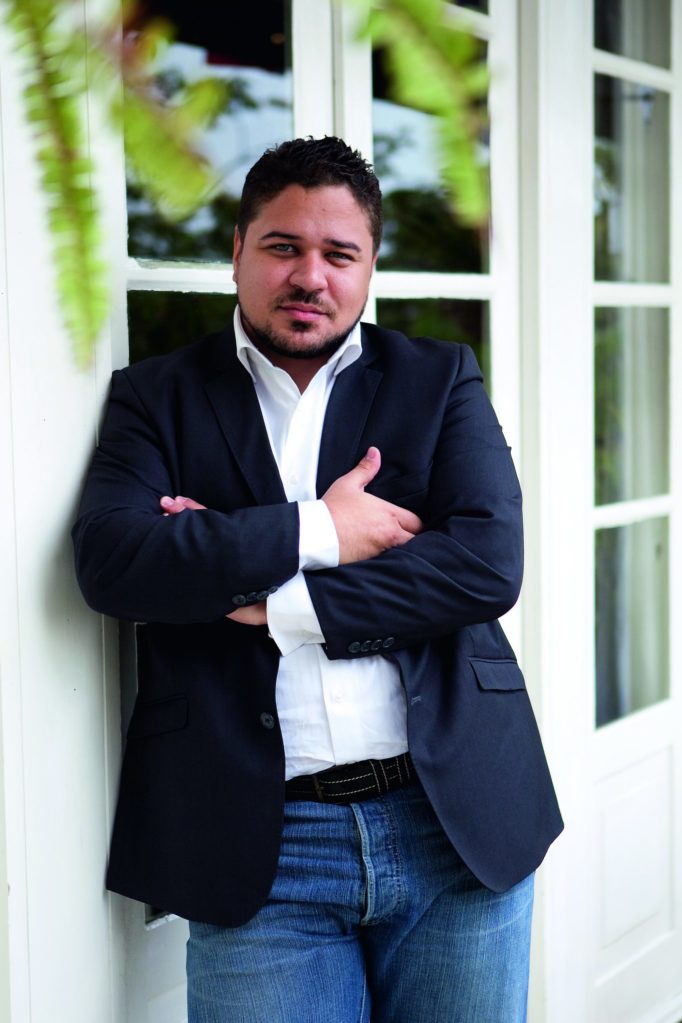In Hotel Continental’s restaurant along the bay of the Angolan capital Luanda, Russo Flora exudes energy, enthusiasm and a deep-seated faith in his country. “Angolans have a natural talent for business and commerce,” is the first thing he says. “During communism and the civil war, food here was very, very scarce.

Flora Russo
We’ve learned to improvise and survive under all circumstances. To me, being an entrepreneur is to create.” Thirty-three-year-old Flora, married with one son, was born and raised in the Angolan capital of Luanda. After studying English in South Africa, he won a sponsorship from the Angolan Fishing Ministry to study civil engineering in London. In 2002, he accepted a job as a senior property consultant at English estate agency, Bairstow Eves, and soon became the best salesman at their northern office. In 2003 he became senior land investment advisor at English Land Partnership.
“All that was part of my strategy to become a property entrepreneur,” he says. But then his father, George Flora, fell ill. Flora decided to move back to Angola, where in 2006, at the age of 26 he took over his father’s small consulting-engineering firm, Gabeng. George Flora became Angola’s Construction Minister in 1984 and founded the business in 1990. Russo Flora now owns Gabeng together with his mother.
“I had to decide whether to remain a small company, or to take Gabeng to a different level and transform it into the group of companies that it is today.” Three months later, Flora closed a contract for an infrastructure and sewage network in Luanda, called Projeto Morar, worth $600,000. It was a tall order for a company with few engineers. “I used to wear the contractors’ boots in the morning, take a quick shower, and then put on my engineers’ suit.
Loading...
I was also our consultant and commercial director.” His hard work paid off. “When I took over in 2008, Gabeng was turning over between $120,000 and $300,000 a year. Six years later, my group of four companies is turning over between $700,000 and $2 million annually.” Flora’s early success further triggered his entrepreneurial creativity. “In 2006, I founded LF Construction.” After roughly four months, Flora closed a contract of $900,000 to do major excavation works in Viana and Barro do Dande, for the construction of two municipal hospitals.

ANGOLA-CENBANK
That same year Flora set up a topographic engineering company, TopoEng. In 2008, LF Construction closed a partnership with Chinese company AC-YAUNG Group. Angola receives huge, oil-backed loans from China to help finance postwar reconstruction projects, carried out mostly by the Chinese. Flora “decided to catch the wave rather than swim against the tide”, which paid off. They built a large logistical base for TeleService in Soyo province for 300 “low-income, decent-sized” houses for Angola’s war veterans. Flora is confident about the potential of his company: “I believe LF Construction is our future.”
Flora’s fourth company, ITO, is not yet officially registered. “With big construction projects, I often ended up managing small construction works such as kitchens, done by others. So I decided to do that myself.” ITO comes with important side benefits, he explains. “In Angola, people don’t know who to call, who to trust. That’s where ITO comes in. You never know whose door you might walk into. It might be a successful businessman who offers you a big contract, which has already happened.” Condominium management, an upcoming market in Angola, will become one of ITO’s focus areas.
Being an entrepreneur in Angola is not a picnic. In the World Bank’s Doing Business in 2011 report, Angola ranks 163 out of 183 economies for Ease of Doing Business. “We have great problems in terms of electricity and water supply. So first buy a generator and a water reservoir,” says Flora. “Then there is a lot of bureaucracy involved in importing goods via the harbor. Road access and traffic jams are problematic, the latter mainly in Luanda… I believe in time management. One of my most innovative ideas was to have a fully-equipped mobile office in my car.” Finding skilled Angolan labor is also extremely difficult, according to Flora.
“If you want properly trained people, you’re often forced to employ expats, and they’ll cost you three or four times more. Our solution is to outsource work to other foreign companies in Angola.” At the same time, Flora uses 70% Angolan labor. On Transparency International’s Corruption Perception Index, Angola ranks among the world’s 10 most corrupt countries—168 out of 178. “Corruption is still a big issue in developing countries,” Flora says, “Competition here is tough and often unfair. But at least it’s transparent. People tell you: ‘Listen, if you don’t have good connections here, forget it.’entities.
“Everything we’ve done is thanks to sweat and hard work. If I had strong ties with the truly influential people here, then maybe we would be having this conversation in my private jet.” According to him, Angola is entering a new era. “The government is tackling corruption,” he says. “And I do not foresee any new civil war or political instability.” With Flora’s positive outlook, the sky is the limit. “Within LF Construction I’m opening a food division. We want to buy big quantities of fish and transport those to the most remote rural areas of Angola, where fish prices are extremely high.”

“The fishing industry is one of Angola’s monopolies,” he explains. “Foreign ships come in, suck up huge quantities of fish and transport them back to their own countries. But the fish you find in Angolan supermarkets has all been imported.” Flora encourages all entrepreneurs to take a close look at Angola. “Angola is a rich country, and there are dividends to be made. Anywhere you go you can either plant, build, or mine something.”
Loading...
